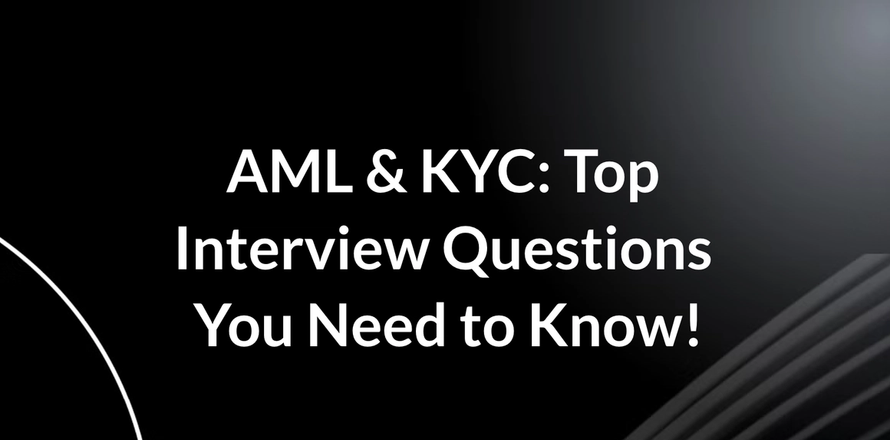Top AML & KYC Interview Questions: Quick and Simple Guide

1. What’s the Deal with Transaction Monitoring in AML?
Transaction monitoring is like a watchdog for financial transactions, aiming to spot any suspicious activities. It's all about keeping an eye on the movement of money to detect potential money laundering or other illegal activities. Using algorithms and rules, institutions can review transactions quickly and efficiently.
2. Why Is Transaction Monitoring Such a Big Deal?
It plays a critical role in spotting and stopping money laundering and terrorist financing. Not only does it help institutions meet legal requirements, but it also protects their reputation by preventing illicit activities from slipping through the cracks.
3. Which Transactions Are Usually Monitored?
Financial institutions track a range of activities, including:
- Cash deposits and withdrawals.
- Wire transfers, especially international.
- Transactions that are unusually large or don't match a customer's typical behavior.
4. What Are the Red Flags in Transaction Monitoring?
Some signs that might signal trouble include:
- Large or frequent cash deposits.
- Rapid transfers between accounts.
- Activities inconsistent with a customer's usual profile.
- Transactions linked to high-risk countries or industries.
5. How Do Automated Monitoring Systems Work?
Automated transaction monitoring uses predefined rules, AI, and machine learning to analyze data in real-time. These systems flag any transactions that seem suspicious, which are then investigated further by compliance teams.
6. How Does Customer Due Diligence (CDD) Support Monitoring?
CDD helps build a risk profile for each customer, which is essential for effective monitoring. By understanding what’s "normal" for a customer, institutions can better detect when something is off.
7. When Should You Review or Update Monitoring Systems?
Ideally, monitoring systems should be reviewed annually or more frequently if there are significant changes in regulatory requirements or market conditions. Regular updates ensure the system can catch new types of suspicious activities.
8. What Happens If Transaction Monitoring Fails?
Ineffective monitoring can lead to serious consequences, including:
- Fines and legal penalties from regulators.
- Reputational damage that affects customer trust.
- Missed criminal activity, resulting in potential security threats.
Related articles

Meeting AML Standards in the UAE: What to Expect in 2025
In 2025, the UAE is enforcing one of its toughest AML/CFT regimes yet, with multi-agency oversight, AI-driven monitoring, and steep penalties reaching AED 50 million. Financial institutions, DNFBPs, and VASPs must strengthen KYC, UBO transparency, and risk-based frameworks to stay compliant and protect operations in this zero-tolerance environment.
Read more
AMLA’s Crypto Crackdown: Why Europe’s New Watchdog Sees Virtual Assets as the Top Money Laundering Threat
The new EU Anti-Money Laundering Authority (AMLA), based in Frankfurt, has placed crypto and virtual assets at the top of its money laundering risk list. For CASPs and financial institutions, this means tougher EU-wide supervision, stricter KYC and monitoring obligations, and higher compliance costs. Early preparation — from policy reviews to blockchain analytics — will be key for firms aiming to stay credible and competitive in Europe’s more regulated market.
Read more
UAE Launches Cutting-Edge Digital KYC Platform to Boost Financial Transparency
The United Arab Emirates (UAE) has launched a groundbreaking digital Know Your Customer (KYC) platform under Federal Decree-Law No. 30 of 2024, showcasing its commitment to financial transparency and innovation. This advanced platform streamlines identity verification, strengthens regulatory compliance, and bolsters trust in the banking and insurance sectors. With strict oversight by the UAE Central Bank and severe penalties for data breaches, this initiative modernizes the financial sector while enhancing economic growth and global competitiveness.
Read more